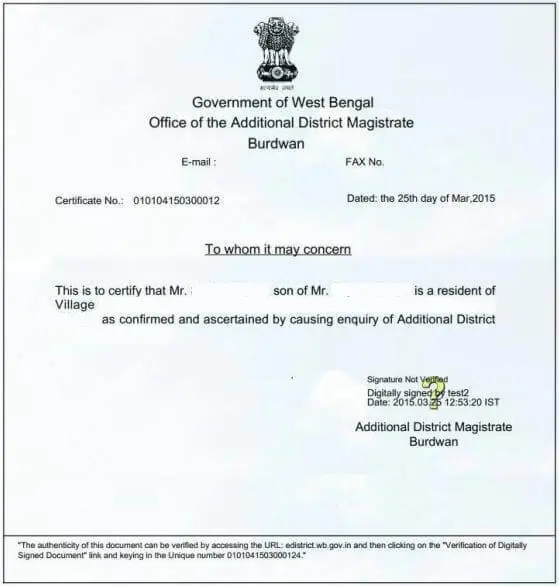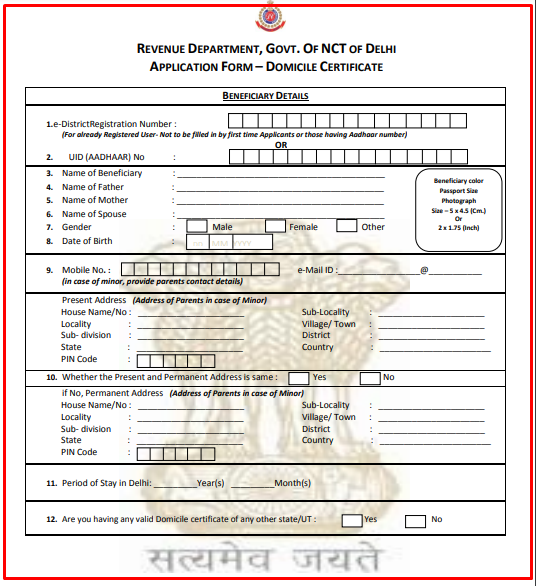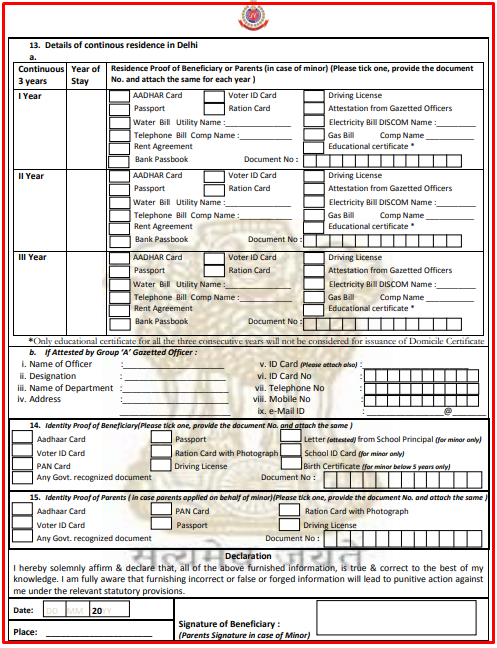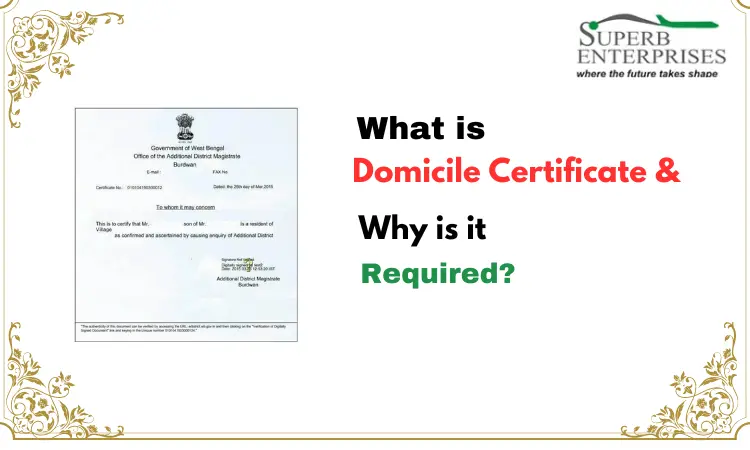Every citizen of India is eligible to have a domicile certificate issued by their home state or Union Territory.
Usually issued by the state government or the administration of a Union Territory, the domicile certificate serves as proof of one’s residence in a specific state or UT across India.
Many state governments offer various grants, relaxations, scholarships, and numerous other benefits for the residents of their state and one can only avail of these benefits
if they have a legal and valid domicile certificate. Students also require a domicile certificate to secure admission to schools and higher education institutions within the country.
In this blog, we will provide detail information about what is Domicile Certificate, why need, its types, eligibility criteria, Documents Required, how to apply both online and offline, and more
What is Domicile Certificate?
Each state government and administration of Union Territories issue an official document to each resident to prove that these residents are the citizens of their respective states and UTs.
A Domicile certificate, in short, is an official document that proves an individual’s citizenship on a state level. It in fact a state-level residency certificate aimed to indicate that the person is a permanent resident of a specific state.
It is issued by the responsible authorities to all eligible candidates irrespective of their caste, creed, religion, etc. The domicile certificate can prove to be very useful in various bureaucratic processes in the country.

Types of Domicile Certificates
Essentially there are three different types of domicile certificates issued under different circumstances.
- Domicile by Birth – As the name suggests, each state issues domicile by birth to individuals born in the respective states. The validity of domicile by birth is lifelong or until the individual permanently moves to a different state or UT. Even if a person temporarily moves for education or employment their domicile by birth remains valid.
- Domicile by Choice – It is issued to individuals who move out of their home state/birth state to settle down permanently in a new state/UT. For domicile by choice to be issued to an individual they must meet the specific criteria of the new state they are moving to. Each state has different requirements of residency so make sure you are eligible for citizenship of the new state you wish to move to.
- Domicile by Dependence – This domicile certificate is issued to the dependents, i.e., the wife and children of a person who already holds a domicile certificate in a particular State/UT. For example, if a man holds a domicile in Karnataka, his wife, and children will also be granted the domicile in Karnataka as they are dependent on him.
Benefits of a Domicile Certificate
What is domicile certificate you already know now tell me tell you its benefits Domicile certificate is an important legal document that is used for various purposes. Discussed below are some of the most important uses of domicile certificates.
- Educational Uses – A domicile certificate is compulsory for securing admission against seats reserved for local residents. State governments also offer concessions, scholarships and other monetary benefits for local students. And to avail of these benefits the students will need a suitable domicile certificate.
- KYC Document – The domicile certificate is a valid KYC (know your customer) that can be used in any instance where an individual needs to prove their permanent address.
- Employment Opportunities – Many state governments offer reservations for local residents of the state. A domicile certificate can be used to prove the permanent address and in turn, avail the benefits of reservation for local citizens.
- Business Purposes – A domicile certificate helps secure the state government’s funding for a startup. The government makes sure to help the local entrepreneurs first.
- Loan Application – A domicile certificate can be submitted to the authorities as proof of address for loan applications.
Eligibility Criteria for a Domicile Certificate
We have already established that a domicile certificate is a state-level residency certificate. The government of each state and the administration of UTs issue their own domicile certificates so it is only natural that these authorities have their own eligibility criteria. Nonetheless, here are some general requirements to be eligible for a domicile certificate;
- The applicants must have lived in the state for a minimum period specified period. This minimum period of stay changes depending on the state and ranges anywhere between 3 and 15 years.
- Alternatively, the applicant’s parents must hold the domicile of the state.
- The name of the applicant must be in the voter’s list of the state or UT
- Post-marriage, female applicants can apply for the domicile of the state in which their partner resides.
- Some states/UTs might require the applicant to own a property in the state/UT or pay taxes in the state.
- Students may need to show their enrollment in local institutions located in the State/UT.
Documents Required for Domicile Certificate
The applicants need to submit certain documents to apply for a domicile certificate. The documents required may vary depending on the state for which the applicant is applying.
Nonetheless, here are a few general documents that will be required in the majority of cases irrespective of the state/UT; Here is the list of documents needed for the domicile certificate
- A completed domicile application form along with self-declaration
- Identity proof documents such as an Aadhar card, PAN card, voter ID, driving license, passport, etc are required to establish the applicant’s identity.
- The applicant’s birth certificate
- Two passport-sized photographs
- School Leaving Certificate (SLC)
- The candidates need to further provide address proof documents which can include the bank passbook, rental agreement, and utility bills such as electricity, gas, internet, etc.
- Affidavit from the court or the Tahsildar
Cost and Fees Associated with Domicile Certificate
The cost of domicile in India varies depending on the state you are applying for but it is pretty minimal ranging anywhere from INR 15 to INR 100. Some states and Union Territories do not charge any fee at all like Uttar Pradesh and New Delhi.
Certain states and UTs may charge higher fees but that is an unlikely scenario. Additional costs may include the cost of attestation of documents or service charges levied by the Common Service Centre (CSC) if you choose to submit the application using a CSC.
For the most updated and accurate information regarding the charges associated with domicile certificates, the candidates are requested to visit the respective websites of the state they are applying to.
How to Apply for a Domicile Certificate?
The eligible candidates with all the required documents can apply for a domicile certificate in two ways – Online and offline application. The candidates need to meet all the necessary residential requirements to be eligible for a domicile certificate. Another important point to note is that the process changes based on the state but here are some generalized steps you need to follow for online and offline applications.
Online Application
Candidates need to follow the below-mentioned steps to apply online for a domicile certificate;
- Visit the e-district website of your state/UT (some states like Andhra Pradesh and Uttar Pradesh also have apps through which you can access the portal for online application)
- Sign up if you do not already have an account and log in by using the credentials.
- On the website find the “apply for certificate” and select the “domicile certificate” option. It may be titled differently on different websites.
- Fill up the application form and upload all the required documents
- Pay the fee is applicable
- Do the final submission and note down the application number/acknowledgment number.
- Sit back and wait for the authorities to review your application and once the authorities are certified, your domicile certificate will be issued.
The online application procedure is simple and easy to access. This streamlines the procedure and eliminates any need to visit the government office physically.
Offline Application
If doing things in person is more your style then you can apply for a domicile certificate by following these steps;
- Grab a domicile application form from the respective office based on your location. The offices can be any of the following;
- Tahsildar office
- Revenue office
- District magistrate office or Sub-divisional magistrate
- Collector or deputy collector office
- Mamlatdar office
- Citizen Service Corners (CSC)
- Registrar or sub-registrar Office
- Fill out the application form with all the required details, attach all the documents, and submit it with the required fee (if applicable).
- Collect the acknowledgment number while submitting it to be able to track the progress of your application.
How to Download a Domicile Certificate
The applicants can easily obtain a copy of their domicile certificate from the state/UT’s website. The downloaded certificates hold the same validity as the physical copy. To download the domicile certificate, the applicants need to follow the steps mentioned below;
- Access the e-district website of your state/UT
- Log in to the website using your credentials
- Look for an option titled “Certificate Verification” or “Download Certificate”
- Enter the application/acknowledgment number
- Your certificate will be ready for download in the PDF format
Domicile Certificate Form
Candidates looking for a domicile certificate can approach their local government offices and obtain an official form. The said domicile certificate form contains details such as;
- Name and contact details of the applicant
- Gender
- DOB and age
- Place of birth
- Current and Permanent address
- Details about the father or husband (if applicable)
- Educational details
- Information about the last few years of stay. The number of years varies depending on the state/UT but ranges anywhere between 3 and 15 years.
- A self-declaration with their signature
The format and particulars of a domicile certificate form can change depending on the state/UT you are applying for, however, in the majority of the cases, the different sections remain the same. Here is an example of what a domicile certificate form looks like;


Validity and Renewal of Domicile Certificate
A domicile certificate is one of those rare documents that does not expire and need not be renewed. The certificate’s validity is for a lifetime unless the candidate decides to permanently move to a different state/UT. In that case, the candidate will need to apply for a domicile certificate in their destination state.
In certain cases, some states may offer a domicile certificate that has a limited validity period usually lasting six months to a year. These domicile certificates are issued for specific purposes.
Common Mistakes to Avoid in Domicile Certificate Applications
A domicile certificate is an important document that proves useful in various circumstances. However, any mistakes in the domicile certificate application can lead to unforeseen delays and rejections.
It is important to be extremely careful while filling out the domicile certificate application. Listed below are some common mistakes to avoid;
- Incomplete form – Ensure that all the details in the form are filled correctly. Leaving out compulsory sections in the form can lead to delays and even rejection.
- Inaccurate Information – Any discrepancy, no matter how small can lead to the application being rejected. It is better to double-check all the information and make sure it is matching with the supporting documents.
- Insufficient Documentation – It is utterly important to submit the complete and correct documents to the responsible authorities. Any missing documents can cause issues for the applicant.
- Not Following the Guidelines – Deviating from the prescribed specifications and instructions can lead to the applicants making avoidable mistakes.
Make sure you follow the guidelines, fill out the correct information, cross-check the details, and most important of all, submit the complete and correct documents to avoid any unnecessary delays and complications.
Difference Between a Domicile and a Resident Certificate.
A domicile certificate can be easily confused with a resident certificate because while there are subtle differences in their uses and applications, to the uninformed general population, both domicile and resident certificates may come across as the same. Here is what differentiates the two;
| Domicile Certificate | Resident Certificate |
| It is an official certificate issued by the various states and Union Territories that acts as proof of permanent residence in the respective states. | On the other hand, a resident certificate is the proof of current residential address of the concerned person. |
| It is essential for obtaining the benefits of various government schemes launched for the native citizens of the state. | The resident certificate is used for obtaining local services and utilities such as gas, electric, and other such connections. |
Frequently Asked Questions
No, they are two entirely different documents. A domicile certificate is a state-level issued certificate that acts as a proof of permanent residence of a candidate. However, a residence certificate is used to prove the current living address of an individual.
It is a unique alphanumeric number assigned to each domicile certificate. The format of the domicile certificate number changes according to the issuing authority. The domicile certificate number also helps set each certificate apart from one another
The eligibility criteria depends on the state you are applying to, nonetheless, the individuals need to meet the general requirements such as;
1. Must be living in the state/UT for a specific number of years
2. Alternatively, parents must be living in the state
3. Owning a property in the State/UT also makes candidates eligible
Many other requirements are depending on your destination state. Check the specifications before applying
No, each person can only have one domicile certificate. Under no circumstance will an individual be issued two more certificates of permanent residence.
As domicile is a state-level affair, the timeline also varies according to the state. In some states, you can get your domicile within 14 days whereas in others it may take up to 3 weeks. So on average, it takes anywhere between 14-21 days to obtain a domicile certificate.
Yes, it is possible to get your domicile certificate canceled or revoked. You can do so by submitting an application to the issuing authorities making your intentions of surrendering the domicile clear.
It is not transferable but a person can change their domicile state if they meet the residency requirements of the new state they want to live in.
No, as the domicile certificate is proof of an individual’s permanent residency, the domicile and permanent address cannot be different.
No, a domicile certificate is proof of your permanent residence in any state/UT within India. On the other hand, a nationality certificate is proof of Indian citizenship.
This only applies to female candidates as they are eligible to change their domicile to their husband’s after marriage.
Read Our Popular Blog




